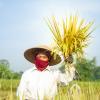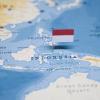
IIASA researchers contributed to a project of the Food and Agriculture Organization of the United Nations (FAO), working in partnership with scientists from other renowned institutions, to help the government of Indonesia advance actionable agrifood systems policies based on rigorous scientific assessment.
Famous for its nature and beautiful scenery, Indonesia is the largest economy in Southeast Asia and an increasingly popular tourist destination. Rapid economic growth and significant government investments in social development transformed have the lives of millions of people, allowing the country to halve the number of undernourished people by 2015. However, although the country continues to make considerable progress towards Zero Hunger, it still faces some challenges in terms of limited food access and malnutrition, according to the World Food Programme (WFP).
Despite the complexities of its diverse geography and burgeoning population, Indonesia is forging ahead with innovative strategies to ensure food and nutrition security while safeguarding its natural resources for future generations through agrifood systems transformation. Recently, together with the FAO and a group of international research institutes, the Indonesian government embraced a pioneering modeling and analytical approach.
The approach combines the models MIRAGRODEP, GLOBIOM and CGPE. It has been developed by a team of IIASA researchers and their colleagues from the Christian-Albrechts-University of Kiel, the International Food Policy Research Institute (IFPRI), and the International Institute for Sustainable Development (IISD) under FAO’s Governance innovation for sustainable development of food systems project. Indonesia’s Bogor Agricultural University (IPB) facilitated the data collection and supported the political economy analysis.
“Our study was focused on modeling stylized scenarios representing different mixes of policy interventions on key priority areas: agricultural intensification, undernourishment, land use and forest conservation, and carbon price,” explains IIASA Biodiversiry and Natural Resources Program Director, Petr Havlik, one of the authors of the study.
The team elaborated their analysis aligning results to three of Indonesia’s strategic priorities, one for each sustainability dimension: promoting healthy diets, improving the socioeconomic sustainability of agrifood supply chains, and advancing agrifood production systems for environmental sustainability. They assessed the performance of Indonesian agrifood systems while mapping risks and synergies across possible policy interventions.
“The modeling work and analytical exercises help us see trade-offs and scrutinize more policy options to transform our food systems,” stated Jarot Indarto, Director of Food and Agriculture at Indonesia’s Ministry of National Development Planning. “We are seeking to integrate our country’s diversity of contexts into this work.”
The findings of the study are consolidated in a new report and policy brief. From the IIASA side, the report was authored by researchers from the Integrated Biosphere Futures Research Group, Esther Boere, Andrey Augustynczik, Marta Kozicka, Petr Havlik, and Hugo Valin, who was formerly a senior researcher at IIASA.
Key findings.
The findings, co-designed, discussed and validated by national actors, provide a detailed picture of progress made, and present options for further improvements in the way forward:
- Steady progress: Indonesia's current trajectory indicates commendable progress across various fronts. Economic growth and increased incomes are poised to alleviate poverty and undernourishment. Furthermore, deforestation rates are projected to decline, albeit with lingering challenges in forest conservation and potential increased competition in land use across sectors.
- Accelerating progress: Targeted policy interventions offer a means to expedite achievements. Social safety nets, tailored to address vulnerable demographics, hold promise for enhancing access to nutritious foods. Concurrently, investments in agricultural research and infrastructure can catalyze productivity gains, thereby bolstering food security.
- Navigating trade-offs and synergies: The pursuit of multifaceted goals also shows potential nuanced trade-offs and synergies across policy interventions. Scenarios show, for instance, that while social safety nets have a positive direct impact on alleviating undernourishment, they may spur cropland expansion, posing challenges for biodiversity conservation and other natural resources management. Conversely, interventions aimed at environmental preservation may impose marginal costs on food production, reducing socioeconomic access to healthy diets.
- Integrated solutions: A holistic approach to policymaking is paramount, and choices need to be made based on complex realities. Integrated packages across-, and balancing multiple development objectives including improving nutrition, production efficiency, waste and water use reduction, and conservation efforts, emerge as the most effective strategies to enhance transformation. Evidence to carefully balance and target interventions is a game-changer.
- Regional dynamics: Indonesia's diverse regional landscape underscores the need for tailored strategies. Policy effectiveness varies across regions, necessitating localized approaches. Policymakers must meticulously evaluate regional nuances and ensure equitable distribution of benefits. While evidence was also provided at the sub-national level informing the ongoing tailoring of interventions at the decentralized level, a fiscal policy has been piloted to unlock public resources and catalyze investments, particularly at the decentralized level.
Adapted from a press release prepared by the FAO. Read the original article here.
News

30 August 2023
The IIASA Summer Experience: A Blend of Learning and Experience in a nurturing atmosphere

24 May 2023
Strengthening ties between IIASA and Indonesia

30 March 2021




